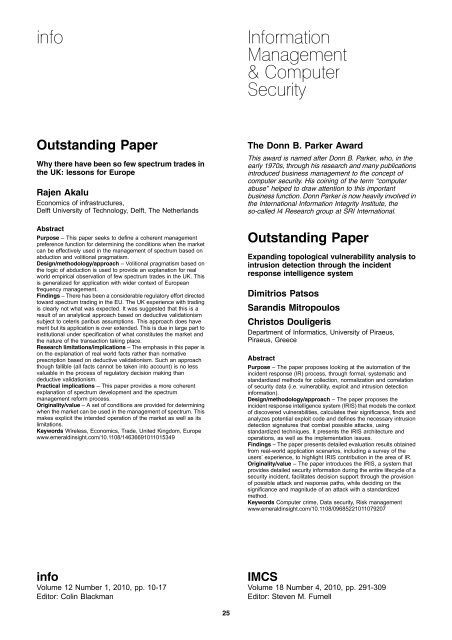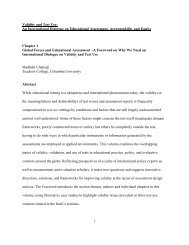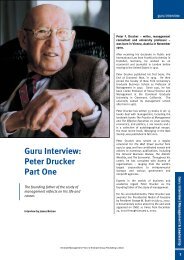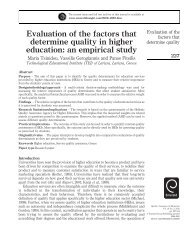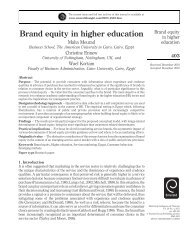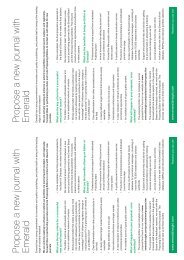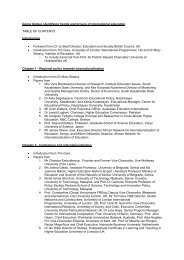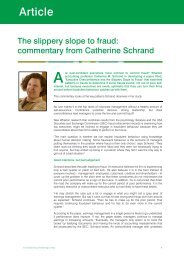Outstanding Paper - Emerald
Outstanding Paper - Emerald
Outstanding Paper - Emerald
Create successful ePaper yourself
Turn your PDF publications into a flip-book with our unique Google optimized e-Paper software.
info<br />
<strong>Outstanding</strong> <strong>Paper</strong><br />
Why there have been so few spectrum trades in<br />
the UK: lessons for Europe<br />
Rajen Akalu<br />
Economics of infrastructures,<br />
Delft University of Technology, Delft, The Netherlands<br />
Abstract<br />
Purpose – This paper seeks to define a coherent management<br />
preference function for determining the conditions when the market<br />
can be effectively used in the management of spectrum based on<br />
abduction and volitional pragmatism.<br />
Design/methodology/approach – Volitional pragmatism based on<br />
the logic of abduction is used to provide an explanation for real<br />
world empirical observation of few spectrum trades in the UK. This<br />
is generalized for application with wider context of European<br />
frequency management.<br />
Findings – There has been a considerable regulatory effort directed<br />
toward spectrum trading in the EU. The UK experience with trading<br />
is clearly not what was expected. It was suggested that this is a<br />
result of an analytical approach based on deductive validationism<br />
subject to ceteris paribus assumptions. This approach does have<br />
merit but its application is over extended. This is due in large part to<br />
institutional under specification of what constitutes the market and<br />
the nature of the transaction taking place.<br />
Research limitations/implications – The emphasis in this paper is<br />
on the explanation of real world facts rather than normative<br />
prescription based on deductive validationism. Such an approach<br />
though fallible (all facts cannot be taken into account) is no less<br />
valuable in the process of regulatory decision making than<br />
deductive validationism.<br />
Practical implications – This paper provides a more coherent<br />
explanation of spectrum development and the spectrum<br />
management reform process.<br />
Originality/value – A set of conditions are provided for determining<br />
when the market can be used in the management of spectrum. This<br />
makes explicit the intended operation of the market as well as its<br />
limitations.<br />
Keywords Wireless, Economics, Trade, United Kingdom, Europe<br />
www.emeraldinsight.com/10.1108/14636691011015349<br />
info<br />
Volume 12 Number 1, 2010, pp. 10-17<br />
Editor: Colin Blackman<br />
25<br />
Information<br />
Management<br />
& Computer<br />
Security<br />
The Donn B. Parker Award<br />
This award is named after Donn B. Parker, who, in the<br />
early 1970s, through his research and many publications<br />
introduced business management to the concept of<br />
computer security. His coining of the term ‘‘computer<br />
abuse’’ helped to draw attention to this important<br />
business function. Donn Parker is now heavily involved in<br />
the International Information Integrity Institute, the<br />
so-called I4 Research group at SRI International.<br />
<strong>Outstanding</strong> <strong>Paper</strong><br />
Expanding topological vulnerability analysis to<br />
intrusion detection through the incident<br />
response intelligence system<br />
Dimitrios Patsos<br />
Sarandis Mitropoulos<br />
Christos Douligeris<br />
Department of Informatics, University of Piraeus,<br />
Piraeus, Greece<br />
Abstract<br />
Purpose – The paper proposes looking at the automation of the<br />
incident response (IR) process, through formal, systematic and<br />
standardized methods for collection, normalization and correlation<br />
of security data (i.e. vulnerability, exploit and intrusion detection<br />
information).<br />
Design/methodology/approach – The paper proposes the<br />
incident response intelligence system (IRIS) that models the context<br />
of discovered vulnerabilities, calculates their significance, finds and<br />
analyzes potential exploit code and defines the necessary intrusion<br />
detection signatures that combat possible attacks, using<br />
standardized techniques. It presents the IRIS architecture and<br />
operations, as well as the implementation issues.<br />
Findings – The paper presents detailed evaluation results obtained<br />
from real-world application scenarios, including a survey of the<br />
users’ experience, to highlight IRIS contribution in the area of IR.<br />
Originality/value – The paper introduces the IRIS, a system that<br />
provides detailed security information during the entire lifecycle of a<br />
security incident, facilitates decision support through the provision<br />
of possible attack and response paths, while deciding on the<br />
significance and magnitude of an attack with a standardized<br />
method.<br />
Keywords Computer crime, Data security, Risk management<br />
www.emeraldinsight.com/10.1108/09685221011079207<br />
IMCS<br />
Volume 18 Number 4, 2010, pp. 291-309<br />
Editor: Steven M. Furnell


